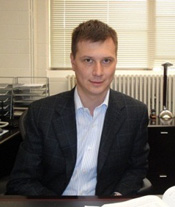NEWS & EVENTS
Professor Alex Shestopalov Awarded $799,000 NSF Grant
Gavett Hall will soon house an advanced X-ray photoelectron spectrometer (XPS), as the result of a $799,000 grant awarded by the National Science Foundation to a team headed by Alex Shestopalov, assistant professor of chemical engineering..
Acquisition of the highly sensitive analytical and imaging device, which will become part of the University’s Integrated Nanosystems Center (URnano), will enable researchers to study the basic composition and chemical and electronic states of materials within a single atomic layer at the surface, and also take images of chemically distinctive patterns.
This will further a wide range of University research efforts, including alternative solar cell technologies, more efficient production of quantum dots, development of new biomedical devices, and the preservation of aging daguerreotypes.
It will be available to researchers outside the University, and will be the only such shared device between Buffalo and Ithaca, providing opportunities for collaboration with RIT and surrounding companies, such as Kodak, Bausch & Lomb, Xerox, Plextronics and MoshBaer Technologies.
“In general, any research facility in Rochester or close to it will have access to the instrument,” Shestopalov said.
The XPS will also be incorporated into classroom instruction. Three UR courses will be modified so that students in engineering, physics and materials science can have hands-on experience with the instrument.
The Kratos AXIS Ultra DLD XPS will include these features:
A glove box system attached to the entry port, which will allow analysis of air and moisture sensitive samples.
Fully automatic operation 24 hours a day, 7 days a week. This will allow analysis of samples from distant research institutions overnight or on weekends without disrupting normal use of the instrument.
The device will officially become part of URnano after the grant’s one-year funding period expires.
URnano already has an array of advanced electron microscopes that provide excellent imaging capabilities. The XPS device, with its capabilities to analyze composition, “adds nicely to the other instruments we have,” Shestopalov said.
Co-principal investigators for this project are Nicholas Bigelow, director of URnano, chair of the Department of Physics, Lee A. DuBridge Professor of Physics, and professor of optics; Yongli Gao, professor of physics; Ching Tang, Doris Johns Cherry Professor of Chemical Engineering and professor of chemistry; and Todd Krauss, professor of chemistry.

